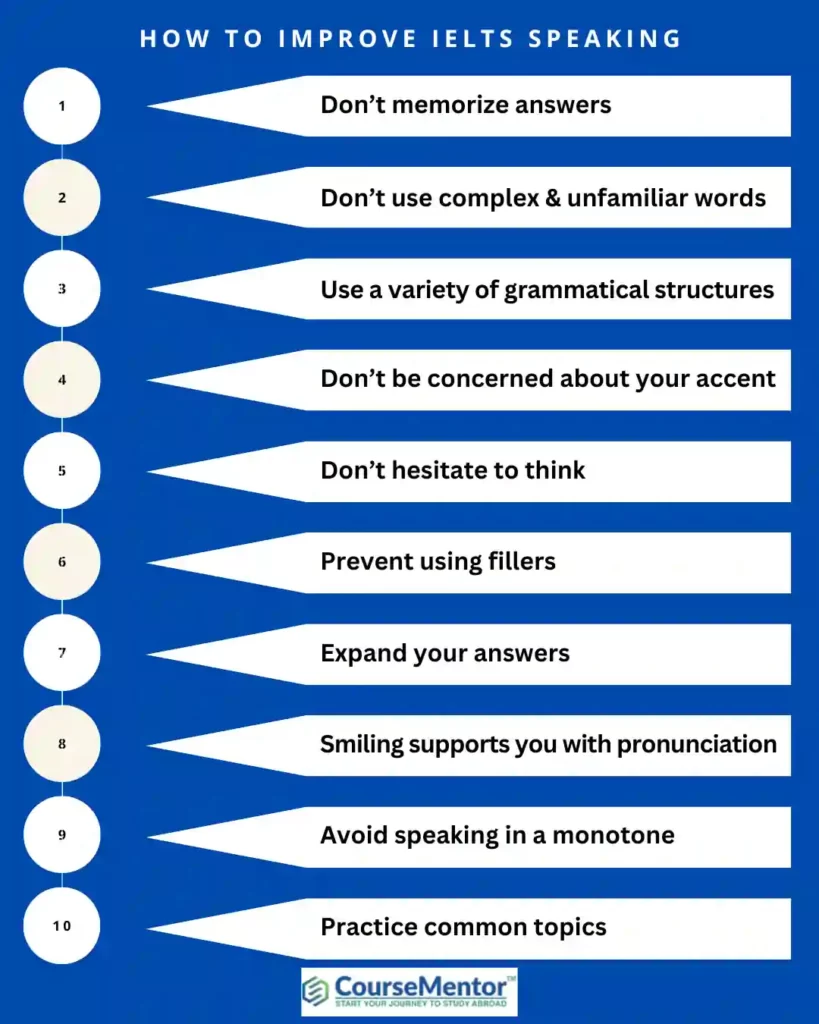IELTS is the most taken exam by students who want to migrate to an English-speaking nation to study or work.
The IELTS test is conducted by the IDP (International Development Program). This test measures the test takers’ ability to write, speak, read, and listen in the English language.
More than 3.5 million students yearly take the IELTS exam to prove their language proficiency.
Also, the IELTS exam is accepted by over 11,000 organizations worldwide.
Furthermore, to prove their language proficiency, students must score a good band in each module of the IELTS exam. That is:
- Reading
- Listening
- Writing
- Speaking
In this blog, we will provide the top tips on how to improve IELTS speaking. So read the complete blog to know everything.
But before that, let’s understand about IELTS speaking sedition.
What is the IELTS speaking section?
IELTS Speaking is a one-on-one, informal conversation with an IELTS examiner and is equal for both Academic and General Training.
The test is divided into 3 parts and is prepared to test your pronunciation, smoothness, grammar, and vocabulary.
The three parts of IELTS speaking are:
- Part one – Introductive
- Part two – Cue card
- Part three – Follow-ups
Part one – This is where you answer questions about yourself and your family or everyday topics. You should answer it in about 2-4 sentences.
Part two – Here, you will get IELTS speaking cue cards in which you have to speak on a topic for one to two minutes presented to you by the examiner. There will be bullet points to help you coordinate your talk.
IELTS speaking topics can be several things, but they are designed for anyone to be able to answer, so don’t worry about needing specialized knowledge for the test.
Part three – You will have a conversation with the IELTS examiner about the topic given in part 2, discussing it in more detail. Part 3 should take approximately 4 to 5 minutes to complete.
Read our other blog to learn about IELTS Speaking Part 2 Questions And Answers.
How To Improve IELTS Speaking
Here are the best 10 tips on how to improve IELTS speaking:

- Tip 1: Don’t memorize answers
- Tip 2: Don’t use complex and unfamiliar words
- Tip 3: Use a variety of grammatical structures
- Tip 4: Don’t be concerned about your accent
- Tip 5: Don’t hesitate to think
- Tip 6: Prevent using fillers
- Tip 7: Expand your answers
- Tip 8: Smiling supports you with pronunciation
- Tip 9: Avoid speaking in a monotone
- Tip 10: Practice common topics
Tip 1: Don’t memorize answers
Memorized speech won’t give the examiner a precise estimation of your English-language skills. The examiner is capable to tell if you have memorized your answers, and this may affect your final band score. Especially in part 1, don’t memorize answers.
Tip 2: Don’t use complex and unfamiliar words
You may want to impress the examiner with big and strange words in your Speaking test. But, there is a great possibility of making mistakes or confusion by either mispronouncing words or using them in the wrong condition.
Avoid using words you are not familiar with. Errors can affect your final band score. Use the vocabulary you have practiced earlier and know the exact meaning of that.
Tip 3: Use a variety of grammatical structures
When IELTS examiners evaluate your speaking skills, they mark you on the following assessment basis:
- Fluency and coherence
- Lexical resource
- Grammatical range and accuracy
- Pronunciation
Make an effort and use a range of grammatical structures using big and simple sentences to convey what you want to say.
You should record yourself in English to see if you can notice errors, if you hear an error try to correct yourself or practice speaking to friends and know your errors. So it’s important to practice speaking about the past, present, and future using correct tenses. It is the third tip on how to improve IELTS speaking.
Tip 4: Don’t be concerned about your accent
With a person-to-person Speaking test, the IELTS examiner recognizes a vast range of accents so will be able to understand what you say. If you can communicate efficiently, then there is nothing to be concerned about. But do be attentive to sounds that you are struggling with. It is the fourth tip on how to improve IELTS speaking.
Tip 5: Don’t hesitate to think
There is nothing wrong with pausing to think about what to say. It’s very normal as we all do it to process questions. You can use phrases to give you some time to think during the Speaking test phrases such as:
- That’s an interesting topic
- I have never thought about this situation/case, but…
- Wait, Let me see
- That’s a strong point
- That’s a challenging question, but I try and answer it
- Well, some people say that is the case, though, I think.
- Let me organize my thoughts about it
Tip 6: Prevent using fillers
Speak positively and avoid using filler words. We commonly use filler words when we don’t know what to say, however, this conveys to the examiner that you can’t get hold of suitable language or ideas so it’s essential to avoid them and to use the phrases we gave you in Tip 5. It is the sixth tip on how to improve IELTS speaking.
Try to avoid the following fillers:
- Like
- You know
- Umm
- Ahh…
- Well
- Yeah…
Tip 7: Expand your answers
Try and answer the examiner’s questions in length. Extend your answers as much as possible, and don’t wait for the examiner to stack you with another question. When you answer in brief, this shows the examiner that you cannot talk in detail about a topic. If the examiner says “Why?”, they are tempting you to give a reason for your answer and to extend the answer in detail fully.
Tip 8: Smiling supports you with pronunciation
Smiling can helps in calming your nerves which in turn helps your manner of speaking. Make sure to pronounce it clearly, be confident, and you should open your mouth wide enough so that sounds come out clearly. Adopting clear enunciation and tone will show the examiner that you can use a range of pronunciation properties.
Tip 9: Avoid speaking in a monotone
Frequently when we speak, we make a flat sound, a monotone, with little alteration. This makes it extra complicated to communicate what you say and creates more difficulty for the examiner to analyze what parts of your message are essential Putting attention to definite words and halting at sections in your speech can make your conversation with the IELTS examiner more appealing. When we put strength on certain words, it makes it simple to compare and distinguish ideas by stressing keywords. It also helps increase the smoothness of conversation, so remember:
- Avoid speaking in a monotone.
- Vary the stress and intonation to add attention.
- Keep using your hands to gesture and help the flow of the conversation
Tip 10 – Practice common topics
You need to speak for about 2 mins on a given topic in part 2 of the IELTS speaking test. Practice frequent IELTS topics with family, friends, or colleagues to learn and enhance the vocabulary associated with each topic.
Common topics you can practice for the Speaking test are:
- Tourism and travel
- Education
- Transport
- Environment
- Family life
- Sport and recreation
- Crime and punishment
- The Internet
- Advertising and retail
How IELTS Speaking Test Score Measured
After learning about how to improve IELTS speaking, you must also know about the criteria based on which the IELTS speaking test score is measured.
Your IELTS speaking score is marked on four different criteria:
- Fluency and coherence
- Lexical resource
- Grammatical range and accuracy
- Pronunciation
| Fluency and coherence | There should be fluency in your speaking, and you should not take unnecessary pauses. Yes, you can take pauses where necessary, but not too long.Also, you must speak coherently and try to answer all the parts of the questions the examiner asked you. |
| Lexical resource | There should be vocabulary (Lexical resource) in your speaking. It helps you to make your speaking more attractive.Also, you should not add many fancy words in your speaking whose meanings you do not know. You can use phrases and idioms in your speaking time-to-time to make it sound interesting. |
| Grammatical range and accuracy | Your speaking need to be grammatically accurate. You must use a wide range of sentence structures in your speaking with full accuracy to get a high band score in speaking. |
| Pronunciation | The pronunciation of words should be accurate. This is the most important part of your speaking, and if you pronounce any word wrong, it can affect your band score in speaking.You are advised to use any heavy word whose pronunciation you are unsure about. |
Most Common Words You May Have Mispronouncing
This is also an important part of how to improve IELTS speaking because to get a high band score in IELTS speaking, you must pronounce each word accurately.
Here are some of the most common words that students may pronounce wrongly:
- Accessory
- Almond
- Athlete
- Attaché
- Boutique
- Business
- Cache
- Candidate
- Chaos
- Coupon
- Cupboard
- Debut
- Definitely
- Divorce
- Espresso
- Federal
- Film
- Flour
- Genre
- Hierarchy
- Itinerary
- Jewellery
- Library
- Lingerie
- Mischievous
- Niche
- Nuclear
- Often
- Pronunciation
- Probably
- Quote
- Salmon
- Silicon
- Sour
- Stomach
- Suite
- Tuition
- Wednesday
Other Key Tips To Improve IELTS Score
For every student, the answer will vary a bit, depending on your individual English language skills, but some tips for IELTS speaking can be advantageous for all students. For example:
- Don’t try to learn your answers before the IELTS speaking exam
- Speak according to yourself
- Use sample questions to help you out and practice
- Don’t try to rush, speak slowly and calmly, your words should be clear
- Expand your answers to explain exactly what you want to say
Conclusion (How To Improve IELTS Speaking)
We hope you’ve enjoyed reading this blog post on how to improve your IELTS speaking score. We know it can be difficult to improve your speaking score, but if you use the tips we’ve outlined, you should find your speaking score improves in no time.
If you have any further questions about how to improve your IELTS speaking test, please feel free to contact us at CourseMentor™. Thank you for reading, we hope you enjoy the rest of your week!
FAQs (How To Improve IELTS Speaking)
Should I use lots of idioms and phrasal verbs to get Good Bands?
phrasal and idioms for ielts speaking will help you to improve your score for vocabulary, which is 25% of your total mark, but only if you use them correctly. If you use it incorrectly, then it can decrease your IELTS band score.
Can I use contractions?
Yes, it is good to use contractions when you speak as this is how most native English speakers talk.


